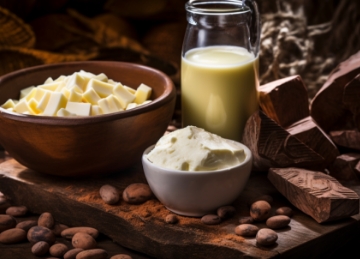Sustainability in Chocolate Production: The Role of Plant-Based Fats and Oils
Have you ever wondered what ingredients make your favourite chocolate fillings and spreads so creamy and delicious? Today, we'll look at the intriguing world of plant-based fats and oils transforming the chocolate business for the better. These natural ingredients not only improve our favourite delicacies but also contribute significantly to environmental sustainability. Are you ready to discover this delightful story? Let's start!
The Sweet Shift to Sustainability
The chocolate industry is striving to become more sustainable, and one of the primary areas of emphasis is the use of plant-based fats and oils. Traditionally, chocolate products rely heavily on cocoa butter, which, although delicious, poses its own set of issues. Cocoa butter manufacturing may be resource-intensive and have a substantial environmental impact. Plant-based alternatives, such as chocolate filling fat and chocolate spread fat, become the heroes of our narrative.
What Is Plant-Based Fats and Oils?
Plant-based fats and oils, derived from seeds, nuts, and fruits like sal butter, shea butter, and mango butter, are transforming the industry. With selective processing, these natural fats mimic the properties of cocoa butter, making them ideal for use in chocolate fillings and spreads. Let’s explore how these alternatives are reshaping the landscape.
The Benefits of Plant-Based Fats and Oils
- Cost-effectiveness:- Cocoa Butter Equivalents (CBE) despite its closeness to cocoa butter properties, comes a super cost-effective alternative in the volatile cocoa price ladder. Plant-based fats like shea and sal can replace up to 5%-100% of cocoa butter without compromising quality, helping manufacturers stabilize production costs and avoid price spikes caused by supply chain disruptions.
- Sustainability: Plant-based fats and oils offer a more sustainable alternative to traditional cocoa butter. Shea and sal, for instance, can yield significant amounts of oil with minimal environmental impact. By adopting these options, the chocolate industry can reduce its carbon footprint and promote more eco-friendly practices.
- Production Versatility: Plant-based chocolate filling and spread fat are quite adaptable. They combine effortlessly with other components, resulting in the ideal texture and consistency. Whether it's a creamy truffle centre or a smooth, spreadable chocolate pleasure, plant-based fats exhibit excellent combability in all major chocolate formulations.
- Sensory Balance- CBE provides the same sensory balance in the chocolates with cocoa butter. After all, chocolates are indulgence food categories driven by the slump sensory feel of flavour release.
- Enhanced Stability and Shelf Life: One of the most noticeable advantages of plant-based fats is enhancing the stability and shelf life of chocolate. These fats assist in avoiding the dreaded fat bloom, which is the unattractive white streaks that sometimes occur on chocolate. Plant-based fats improve product stability, ensuring that chocolates remain fresh and tasty for longer periods.
- Rich Flavour Profiles: Worried about flavour? Don't be. Plant-based fats and oils are carefully treated to preserve the rich, delicious flavour of chocolate. Certain plant-based fats can enhance the flavour profile exhibiting compatibility with the original flavour, creaminess of the chocolate.
The Role of Chocolate Filling Fat and Chocolate Spread Fat
- Chocolate Fillings: These fats keep the centre of your chocolates smooth and creamy, giving you that melt-in-your-mouth sensation we all desire. They assist in keeping the appropriate consistency, giving each bite a genuine joy.
- Chocolate Spreads: Plant-based fats give chocolate spreads a luscious texture and make them simple to spread. Whether you're slathering it on toast or using it as a dip, these fats make the spread velvety and delectable every time.
The Future is Plant-Based
As the chocolate industry evolves, the usage of plant-based fats and oils is expected to expand. These components not only provide practical benefits in terms of texture and durability, but they also meet rising customer demand for sustainable and environmentally friendly goods. By adopting plant-based fats, the chocolate industry can continue to provide high-quality delights while also contributing to a more environmentally sustainable future.
So, the next time you enjoy a creamy chocolate filling or a smooth chocolate spread, take a moment to appreciate the plant-based fats and oils that enable it. They don't simply improve your chocolate experience; they also contribute to a sweeter, more sustainable planet. Enjoy your goodies knowing they are part of a tasty and responsible chocolate-producing movement!







